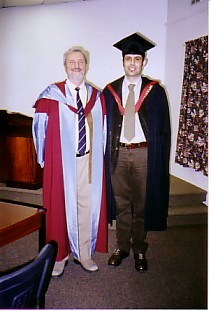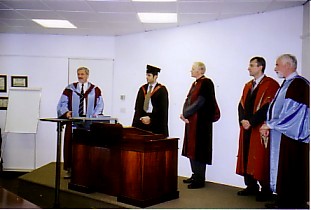On-Line Customer Profiling and Customer Automation: Marketing and Legal Issues
 Francesco Mortelliti from Reggio Calabria recently completed his Master of Philosophy thesis at WIT on the topic of “On-line Customer Profiling and Customer Automation: Marketing and Legal Issues”. The External Examiner was Dr Gerritt Betlem, Reader in European Private Law at the University of Exeter and a distinguished researcher in the field of interaction between public and private law regulation in a transnational setting. Dr Betlem, who has a PhD from the University of Utrecht, is author of several books and many papers and publications focused on the field of non-contractual liability for damage including those due to environmental problems.
Francesco Mortelliti from Reggio Calabria recently completed his Master of Philosophy thesis at WIT on the topic of “On-line Customer Profiling and Customer Automation: Marketing and Legal Issues”. The External Examiner was Dr Gerritt Betlem, Reader in European Private Law at the University of Exeter and a distinguished researcher in the field of interaction between public and private law regulation in a transnational setting. Dr Betlem, who has a PhD from the University of Utrecht, is author of several books and many papers and publications focused on the field of non-contractual liability for damage including those due to environmental problems.
Francesco’s thesis deals with problems related to Online Advertising Networks which make hidden monitoring activities of consumers and collect extensive personal data without the customer’s knowledge or consent. They also offer consumers few, if any, choices about the use and dissemination of their individual information obtained in this matter. Current profiling activities undermine individuals’ expectations of privacy by fundamentally changing the Web experience from one where the consumer can browse and seek for information to one where an individual’s every move is recorded.
The thesis argues that the characteristics of data transfer encourages the unfair treatment of personal information. Multinational processing of click-stream information, warehoused data, and the pressure for secondary use, places the legal rules, data protection policies and information practices under various jurisdiction in direct conflict with each other.
The conflict amongst national data repletion systems implies a lack of protection and results in a very weak guard to Web users all over the World. That is why it is important to identify a hypothetical way to follow in order to solve the international conflicts that reduce or cancel the policy of privacy throughout the Internet and also to develop technological tools for the consumers to defend their privacy.
The concept of Privacy-Enhancing Technologies (PET’S) refers to a variety of technologies that safeguard personal privacy, notably by minimising or eliminating the collection of further processing of identifiable data. Privacy-Enhancing Technologies aim to hinder any undesirable form of processing.
Francesco’s thesis discussed all these points in depth, comparing the treatment of USA and EU law. He argues that Data protection needs an inter-governmental agreement on Information Privacy which ought to include a large number and wide range of signatory countries. The agreement should focus on “establishing an institutional process of norm development designed to facilitate the co-existence of differing regimes and over time promote harmonisation of governing standards for information privacy.”
Francesco’s thesis makes an important contribution to solve a difficult problem affecting modern society. The work was well received by the examiner, who recommended awarding the Master of Philosophy degree to the candidate.


 Wessex Institute
Wessex Institute